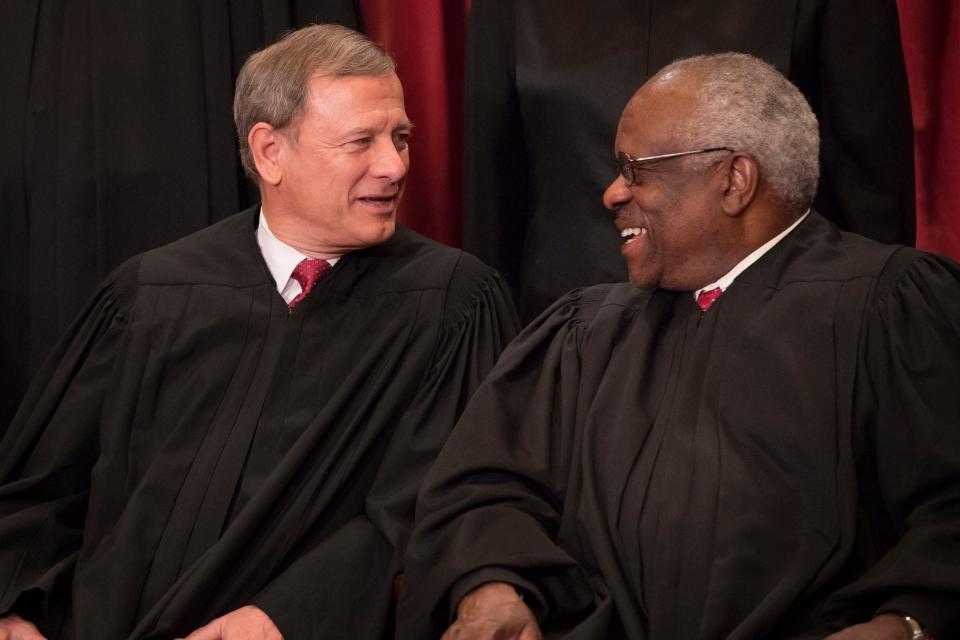Clarence Thomas statue debate: With justice's legacy still to be determined, why the rush?
- Oops!Something went wrong.Please try again later.
- Oops!Something went wrong.Please try again later.
This commentary was written by staff opinion columnist Adam Van Brimmer.
If Georgia is going to honor U.S. Supreme Court Justice Clarence Thomas with a statue on the statehouse grounds, let’s not display the finished sculpture until after Thomas’s death.
Just in case.
Georgia lawmakers are currently considering legislation that would clear the way for a stone tribute to Thomas, the long-serving conservative jurist, to be carved and placed at the Capitol. The bill has already passed the Georgia Senate, championed by Sen. Ben Watson, a Republican whose district includes Savannah’s Pin Point neighborhood home to Thomas’s family.
The measure was introduced in the Georgia House on Feb. 14, a day after clearing the Senate. The quick action betters the chances of the bill’s passing, as does the fact the House is led by another Savannah-area Republican, Speaker Jon Burns of Effingham County.
Earlier reporting: Georgia Senate approves proposal to install Clarence Thomas statue at state Capitol
From Savannah to Supreme Court Justice: Clarence Thomas statue considered for Atlanta
Debate over a Thomas statue has been ongoing since Watson and a Senate colleague launched the campaign for the monument in October 2021. Thomas’s staunchly conservative interpretations of the U.S. Constitution have long made him a lightning rod on the Supreme Court and a pariah among liberals, even here in his hometown.
Animus toward Thomas climbed rapidly in 2022, first when it it was revealed he was the lone justice to dissent against the release of White House documents to the congressional committee investigating the events of Jan. 6, 2021. At the same time, the public learned Thomas’s wife, Ginni, had pressured Trump administration officials to block certification of the 2020 presidential election.
Then in June, Thomas made inflammatory remarks following the high court’s overturning of the Roe v. Wade abortion rights ruling. Those comments attracted more than a million signatures to an online petition calling for his impeachment.
Can you impeach a Supreme Court justice?Petition calls for impeachment of Chatham's Clarence Thomas
The highly partisan tenor now surrounding Thomas is why the Legislature’s push for a statue in the justice’s honor is fueling broad public outcry.
And why if the Republicans who control Georgia’s legislative process succeed at gaining approval for a Thomas statue, they’d best keep it in storage until after the 74-year-old’s legacy is fully determined.

Why court controversy with Clarence Thomas statue now?
Watson’s justification for a Thomas statue is credible.
Thomas’s life story is a moving one. Born into poverty and raised by his grandparents in the Jim Crow South, he parlayed his love of books and knowledge to escape his circumstances and earn a law degree from Yale. His professional career is marked by several stints in government service and he was appointed to the judiciary in 1990, a year before his nomination to the Supreme Court.
He was the second Black American in history to join the high court and has served more than three decades.
"I’m from Savannah and he’s from Savannah and I've known his family for a long time," Watson said. "I have a lot of respect for him. His story is inspirational."

Thomas's 2022 controversies didn't dissuade Watson from filing the statue bill this session. He notes that Thomas's dissenting opinion in the abortion ruling was made on a constitutional basis and that the justice's divisive comments about gay rights and contraception prompted the U.S. Congress to pass bipartisan legislation protecting same-sex marriage.
"His comments were rational comments related to the law," Watson said. "It was the public who didn't take them that way."
A monument for Clarence Thomas? Here are other controversial statues at the Georgia Capitol
The vitriol against Thomas may be driven by partisanship but concerns about Thomas are valid. His Jan. 6 document dissent is suspect given the evidence of his wife’s involvement, and his decreasingly subtle ideological lean in regards to controversial rulings is shaping his legacy.
Georgia lawmakers should weigh the risks and rewards of the situation. They lose nothing in delaying the addition of a Thomas monument to the Capitol grounds.
Should they move ahead, they must realize that the only thing more absurd than a nasty debate over whether to erect a statue is an even more bitter argument about taking that monument down.
Contact Van Brimmer at avanbrimmer@savannahnow.com and follow him on Twitter @SavannahOpinion.
This article originally appeared on Savannah Morning News: Georgia Legislature debates erecting Justice Clarence Thomas statue

